Here's a sample of what's coming out this fall, with my commentary based on the first episode or two. At the end of each entry, I indicate whether I plan on following the series or not.
Asatte no Houkou (The Course for the Day After Tomorrow)
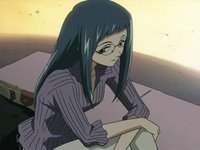 Hiro and his little sister Karada live by themselves in a small town out in the country. Shouko (image) arrives from the city, apparently with some sort of past connection to the town, and to Hiro. Karada, who is worried that she's a burden on her brother, makes a wish at a roadside shrine while Shouko looks on, and the shrine grants her wish in an unexpected way...
Hiro and his little sister Karada live by themselves in a small town out in the country. Shouko (image) arrives from the city, apparently with some sort of past connection to the town, and to Hiro. Karada, who is worried that she's a burden on her brother, makes a wish at a roadside shrine while Shouko looks on, and the shrine grants her wish in an unexpected way...That description is pretty concrete, and it doesn't really capture the feel of this show, which is peculiarly laid-back and vaporous. I get the impression that I'm missing something important as Asatte no Houkou goes through its languorous paces, though there might not be anything to miss: I suspect it's a mood piece, as opposed to one of your more traditional plot-oriented anime.
Watching?: maybe.
Black Lagoon: The Second Barrage
 The "Baddest Motherfuckers in Asian Seas"--as the dustjackets of the first couple of volumes of the manga proclaim, in English--return, nearly three months after the original Black Lagoon ended its run. It's a delayed continuation of the first series, starting with episode 13, and using the same OP and ED as the original. No big changes in the content, either: Revy (image) scowls and looks good in short shorts, things explode in creative and interesting ways, Triad goons and colorful Russian mafia characters give each other a hard time, and salaryman-turned-bounty-hunter Rock acts as the Voice of Reason. Essentially, it's a John Woo-inspired Hollywood bone-cruncher done as anime. One critical difference from the first season to take into consideration: this time around there are way many more incestuous vampiric child-soldier twins.
The "Baddest Motherfuckers in Asian Seas"--as the dustjackets of the first couple of volumes of the manga proclaim, in English--return, nearly three months after the original Black Lagoon ended its run. It's a delayed continuation of the first series, starting with episode 13, and using the same OP and ED as the original. No big changes in the content, either: Revy (image) scowls and looks good in short shorts, things explode in creative and interesting ways, Triad goons and colorful Russian mafia characters give each other a hard time, and salaryman-turned-bounty-hunter Rock acts as the Voice of Reason. Essentially, it's a John Woo-inspired Hollywood bone-cruncher done as anime. One critical difference from the first season to take into consideration: this time around there are way many more incestuous vampiric child-soldier twins.Watching?: probably not.
Busou Renkin (Alchemic Arms)
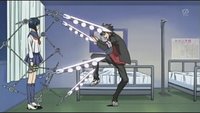 What is it with anime heroes who get killed, symbolically or literally, in the first episode, then are resurrected to fight for justice, as happens to Kazuki (image, at right) in Busou Renkin? Is it just that people liked Yuu Yuu Hakushou, or is there something deeper going on? I smell fodder for a comparitive literature dissertation.
What is it with anime heroes who get killed, symbolically or literally, in the first episode, then are resurrected to fight for justice, as happens to Kazuki (image, at right) in Busou Renkin? Is it just that people liked Yuu Yuu Hakushou, or is there something deeper going on? I smell fodder for a comparitive literature dissertation.Busou Renkin is looking like a fairly mediocre example of this genre, with Kazuki and Tokiko (image, with pointy bits) using the power of alchemy to defend the world from homunculi. People liked HagaRen, too.
Watching?: no.
D. Gray-man
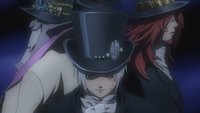 Lurid horror and fighting anime meet, by way of a Shounen Jump manga. Allen Walker (image, center) is an exorcist in 19th century England, battling the Millennium Earl (image, left) and his legion of Akuma (devils). The highlight here is the crazy Victorian/sci-fi ambiance, which I rather like. However, any chance for the development of tension, or an atmosphere of supernatural dread, is pretty much thrown out the window in the first episode, which includes a detailed explanation of what is going on and who needs to have his ass kicked. As near as I can tell (and I haven't read the manga), D. Gray-man is going to be an Akuma-of-the-week show.
Lurid horror and fighting anime meet, by way of a Shounen Jump manga. Allen Walker (image, center) is an exorcist in 19th century England, battling the Millennium Earl (image, left) and his legion of Akuma (devils). The highlight here is the crazy Victorian/sci-fi ambiance, which I rather like. However, any chance for the development of tension, or an atmosphere of supernatural dread, is pretty much thrown out the window in the first episode, which includes a detailed explanation of what is going on and who needs to have his ass kicked. As near as I can tell (and I haven't read the manga), D. Gray-man is going to be an Akuma-of-the-week show.Watching?: no.
Death Note
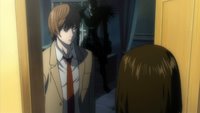 Death Note chronicles a deadly game of cat and also cat--as one of my Venture Brothers-watching friends put it--based on the manga by Tsugumi Ooba and Takeshi Obata (half of the Hikaru no Go team). "Light" (image, left) is an ambitious and talented highschool student, bored with his lot in life. Ryuk (image, background) is an ambitious and talented shinigami (death spirit), bored with his lot in the afterlife. Their paths cross when Ryuk leaves his Death Note--a notebook with the power to kill anyone whose name is written inside--in the human world, and Light picks it up.
Death Note chronicles a deadly game of cat and also cat--as one of my Venture Brothers-watching friends put it--based on the manga by Tsugumi Ooba and Takeshi Obata (half of the Hikaru no Go team). "Light" (image, left) is an ambitious and talented highschool student, bored with his lot in life. Ryuk (image, background) is an ambitious and talented shinigami (death spirit), bored with his lot in the afterlife. Their paths cross when Ryuk leaves his Death Note--a notebook with the power to kill anyone whose name is written inside--in the human world, and Light picks it up.You can imagine how most people would use a Death Note, if they used it at all, so Ryuk and the viewer are kinda surprised when they catch up with Light, who has written hundreds of names on its pages in just a few days. Light has come up with a plan to make the world a better place by killing off as many criminals as he can, in a way that makes it clear that the Wrath of God, or something close, awaits anyone who seriously violates the social contract. Interpol gives their greatest mind, luckily known to the public only as "L," the task of tracking down the mysterious killer. Thus begins a titanic intellectual struggle, in which both Light and L race to be the first to discover the other's true identity. Death Note is gripping in its morbid logic, with smooth and richly detailed animation. It'd be perverse to deny it a spot among the best anime of 2006, if it maintains anything like the quality of the first episodes.
Watching?: yes.
Galaxy Enjeruun: Galaxy Angel II
The latest of what have actually been half a dozen Galaxy Angel shows, courtesy of Broccoli, the Halliburton of the moe-industrial complex. There's a new cast of characters, though they map neatly onto the old cast of characters, and the premise of cute-girl troubleshooters having silly adventures in space remains the same. Some of the gags are fairly amusing, and the animation looks nice (I like the newsprint-style halftone opening), but at the end of the day it's hard to escape the fact that Galaxy Angel II is geared towards viewers who found Dirty Pair Flash a little hard to follow.
Watching?: no.
Watching?: no.
Ghost Hunt
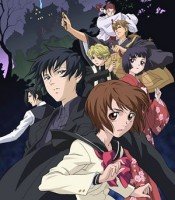 Kazuya Shibuya, boy paranormal investigator and head of Shibuya Psychic Research, is staking out a haunted school building. Mai, a student of the school, stumbles onto the scene and injures Kazuya's assistant. Mai gets pressed into service for the investigation, and is joined by a motley collection of spiritualists, mediums, a miko (shinto shrine maiden, though none of the characters quite believe that she's a maiden), and a pretty-boy Catholic priest. Ghost Hunt, at least in the first episode, nicely balances character development, comic relief, and understated creepiness, and should be worth keeping an eye on. As of the first episode, it's somewhat unclear whether there even are real ghosts; it'd be amusing if the plot took the Scooby-doo route (i.e., old man Takada is using a movie projector and mirrors to scare people off, so he can tear down the school and build a maid cafe).
Kazuya Shibuya, boy paranormal investigator and head of Shibuya Psychic Research, is staking out a haunted school building. Mai, a student of the school, stumbles onto the scene and injures Kazuya's assistant. Mai gets pressed into service for the investigation, and is joined by a motley collection of spiritualists, mediums, a miko (shinto shrine maiden, though none of the characters quite believe that she's a maiden), and a pretty-boy Catholic priest. Ghost Hunt, at least in the first episode, nicely balances character development, comic relief, and understated creepiness, and should be worth keeping an eye on. As of the first episode, it's somewhat unclear whether there even are real ghosts; it'd be amusing if the plot took the Scooby-doo route (i.e., old man Takada is using a movie projector and mirrors to scare people off, so he can tear down the school and build a maid cafe).
Watching?: maybe.
 I don't think I'm clever enough to describe this show in a way that doesn't make it sound incredibly dull, but trust me, it's worth checking out. Matsukata (image) is an earnest young reporter who summons the spirit of Hataraki Man when she's got hold of an important story, enabling her to go without food, sleep, bathing and...er... other important things, until the job is done. The cast of characters is strong and carefully fleshed out, the animation is solid, and there are plenty of grown-up themes, including a pervasive but not overblown idealism about the role of a free press. One jarring element in an otherwise mature and sophisticated anime is the sexism inherent in the Hataraki Man phenomenon: in order to reach her full potential, Matsukata must adopt a masculine persona.
I don't think I'm clever enough to describe this show in a way that doesn't make it sound incredibly dull, but trust me, it's worth checking out. Matsukata (image) is an earnest young reporter who summons the spirit of Hataraki Man when she's got hold of an important story, enabling her to go without food, sleep, bathing and...er... other important things, until the job is done. The cast of characters is strong and carefully fleshed out, the animation is solid, and there are plenty of grown-up themes, including a pervasive but not overblown idealism about the role of a free press. One jarring element in an otherwise mature and sophisticated anime is the sexism inherent in the Hataraki Man phenomenon: in order to reach her full potential, Matsukata must adopt a masculine persona.
Watching?: probably.
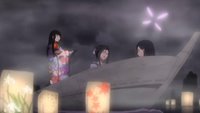 The sequel to last year's Jigoku Shoujo serves up similar fare: stylish, beautifully gloomy animation, traditional Japanese chills in a modern setting, and heaping servings of ice-cold Revenge. Ai (image, manning the oar) is the Hell Girl of the title, a spirit forced to wander the Earth, exacting vengeance upon the wicked on behalf of those who contact her through her website. All that she asks of her petitioners, is that they join her for the boat ride to Hell after their natural deaths.
The sequel to last year's Jigoku Shoujo serves up similar fare: stylish, beautifully gloomy animation, traditional Japanese chills in a modern setting, and heaping servings of ice-cold Revenge. Ai (image, manning the oar) is the Hell Girl of the title, a spirit forced to wander the Earth, exacting vengeance upon the wicked on behalf of those who contact her through her website. All that she asks of her petitioners, is that they join her for the boat ride to Hell after their natural deaths.
Jigoku Shoujo is more or less episodic: I'm guessing we'll see one act of revenge per episode most of the time, and not many continuing characters besides Ai and her lackeys. Still, there is more psychological complexity to this show than you might expect, and I'm finding it to be one the most enjoyable of the many new horror anime available this Halloween.
Watching?: yes.
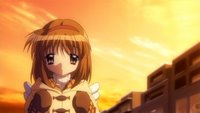 [Prelude video on YouTube] Mmmmm... pretty. The Kanon franchise began in 1999 as a PC bishoujo game, regarded by connoisseurs as one of the all-time greats, with a powerfully affecting story and memorable cast of characters. It was ported to various consoles, and in 2002 received a respectable though abbreviated anime treatment. Anticipation has been running high for the present remake, from production house Kyoto Animation, who ruled the spring 2006 season with the delightful Melancholy of Haruhi Suzumiya. Kanon does not disappoint.
[Prelude video on YouTube] Mmmmm... pretty. The Kanon franchise began in 1999 as a PC bishoujo game, regarded by connoisseurs as one of the all-time greats, with a powerfully affecting story and memorable cast of characters. It was ported to various consoles, and in 2002 received a respectable though abbreviated anime treatment. Anticipation has been running high for the present remake, from production house Kyoto Animation, who ruled the spring 2006 season with the delightful Melancholy of Haruhi Suzumiya. Kanon does not disappoint.
Highschooler Yuuichi Aizawa moves to the snowy north of Japan to stay with his cousin Nayuki, and gradually begins to recover some not-entirely-happy memories of his time there seven years ago. Exploring his new school and town, amid snow squalls and wan winter sunlight, Yuuichi meets the people with whom he shares a dimly-remembered past, including Mai, the local demon hunter (the supernatural battles are going to be insanely well-animated, if Kyo-Ani's work on Haruhi is any indication), and Ayu (image), taiyaki thief and She of the Winged Backpack.
Everything about Kanon--animation, voice acting, backgrounds, music, everything--is top-notch, simply orders of magnitude better than the other romantic comedies/dramas airing right now. The character designs look like complex constructions of colored glass, and they move, too. Settings are lovingly portrayed, with glorious attention to detail. Even the slapstick comic relief is outstanding: the scene where Makoto gets a gelatinous slab of konnyaku down the back of her PJs just about killed me. I only expect it to get better as it moves into more serious territory.
Watching?: oh god yes.
 Kazuya Shibuya, boy paranormal investigator and head of Shibuya Psychic Research, is staking out a haunted school building. Mai, a student of the school, stumbles onto the scene and injures Kazuya's assistant. Mai gets pressed into service for the investigation, and is joined by a motley collection of spiritualists, mediums, a miko (shinto shrine maiden, though none of the characters quite believe that she's a maiden), and a pretty-boy Catholic priest. Ghost Hunt, at least in the first episode, nicely balances character development, comic relief, and understated creepiness, and should be worth keeping an eye on. As of the first episode, it's somewhat unclear whether there even are real ghosts; it'd be amusing if the plot took the Scooby-doo route (i.e., old man Takada is using a movie projector and mirrors to scare people off, so he can tear down the school and build a maid cafe).
Kazuya Shibuya, boy paranormal investigator and head of Shibuya Psychic Research, is staking out a haunted school building. Mai, a student of the school, stumbles onto the scene and injures Kazuya's assistant. Mai gets pressed into service for the investigation, and is joined by a motley collection of spiritualists, mediums, a miko (shinto shrine maiden, though none of the characters quite believe that she's a maiden), and a pretty-boy Catholic priest. Ghost Hunt, at least in the first episode, nicely balances character development, comic relief, and understated creepiness, and should be worth keeping an eye on. As of the first episode, it's somewhat unclear whether there even are real ghosts; it'd be amusing if the plot took the Scooby-doo route (i.e., old man Takada is using a movie projector and mirrors to scare people off, so he can tear down the school and build a maid cafe).Watching?: maybe.
Hataraki Man (Work Man)
 I don't think I'm clever enough to describe this show in a way that doesn't make it sound incredibly dull, but trust me, it's worth checking out. Matsukata (image) is an earnest young reporter who summons the spirit of Hataraki Man when she's got hold of an important story, enabling her to go without food, sleep, bathing and...er... other important things, until the job is done. The cast of characters is strong and carefully fleshed out, the animation is solid, and there are plenty of grown-up themes, including a pervasive but not overblown idealism about the role of a free press. One jarring element in an otherwise mature and sophisticated anime is the sexism inherent in the Hataraki Man phenomenon: in order to reach her full potential, Matsukata must adopt a masculine persona.
I don't think I'm clever enough to describe this show in a way that doesn't make it sound incredibly dull, but trust me, it's worth checking out. Matsukata (image) is an earnest young reporter who summons the spirit of Hataraki Man when she's got hold of an important story, enabling her to go without food, sleep, bathing and...er... other important things, until the job is done. The cast of characters is strong and carefully fleshed out, the animation is solid, and there are plenty of grown-up themes, including a pervasive but not overblown idealism about the role of a free press. One jarring element in an otherwise mature and sophisticated anime is the sexism inherent in the Hataraki Man phenomenon: in order to reach her full potential, Matsukata must adopt a masculine persona.Watching?: probably.
Jigoku Shoujo: Futakomori (Hell Girl: The Two Prisoners)
 The sequel to last year's Jigoku Shoujo serves up similar fare: stylish, beautifully gloomy animation, traditional Japanese chills in a modern setting, and heaping servings of ice-cold Revenge. Ai (image, manning the oar) is the Hell Girl of the title, a spirit forced to wander the Earth, exacting vengeance upon the wicked on behalf of those who contact her through her website. All that she asks of her petitioners, is that they join her for the boat ride to Hell after their natural deaths.
The sequel to last year's Jigoku Shoujo serves up similar fare: stylish, beautifully gloomy animation, traditional Japanese chills in a modern setting, and heaping servings of ice-cold Revenge. Ai (image, manning the oar) is the Hell Girl of the title, a spirit forced to wander the Earth, exacting vengeance upon the wicked on behalf of those who contact her through her website. All that she asks of her petitioners, is that they join her for the boat ride to Hell after their natural deaths.Jigoku Shoujo is more or less episodic: I'm guessing we'll see one act of revenge per episode most of the time, and not many continuing characters besides Ai and her lackeys. Still, there is more psychological complexity to this show than you might expect, and I'm finding it to be one the most enjoyable of the many new horror anime available this Halloween.
Watching?: yes.
Kanon
 [Prelude video on YouTube] Mmmmm... pretty. The Kanon franchise began in 1999 as a PC bishoujo game, regarded by connoisseurs as one of the all-time greats, with a powerfully affecting story and memorable cast of characters. It was ported to various consoles, and in 2002 received a respectable though abbreviated anime treatment. Anticipation has been running high for the present remake, from production house Kyoto Animation, who ruled the spring 2006 season with the delightful Melancholy of Haruhi Suzumiya. Kanon does not disappoint.
[Prelude video on YouTube] Mmmmm... pretty. The Kanon franchise began in 1999 as a PC bishoujo game, regarded by connoisseurs as one of the all-time greats, with a powerfully affecting story and memorable cast of characters. It was ported to various consoles, and in 2002 received a respectable though abbreviated anime treatment. Anticipation has been running high for the present remake, from production house Kyoto Animation, who ruled the spring 2006 season with the delightful Melancholy of Haruhi Suzumiya. Kanon does not disappoint.Highschooler Yuuichi Aizawa moves to the snowy north of Japan to stay with his cousin Nayuki, and gradually begins to recover some not-entirely-happy memories of his time there seven years ago. Exploring his new school and town, amid snow squalls and wan winter sunlight, Yuuichi meets the people with whom he shares a dimly-remembered past, including Mai, the local demon hunter (the supernatural battles are going to be insanely well-animated, if Kyo-Ani's work on Haruhi is any indication), and Ayu (image), taiyaki thief and She of the Winged Backpack.
Everything about Kanon--animation, voice acting, backgrounds, music, everything--is top-notch, simply orders of magnitude better than the other romantic comedies/dramas airing right now. The character designs look like complex constructions of colored glass, and they move, too. Settings are lovingly portrayed, with glorious attention to detail. Even the slapstick comic relief is outstanding: the scene where Makoto gets a gelatinous slab of konnyaku down the back of her PJs just about killed me. I only expect it to get better as it moves into more serious territory.
Watching?: oh god yes.
--
OK, that's 20% of the autumn anime. Check back soon for part II: Lovely Idol through Yoake Mae Yori Ruriiro na~Crescent Love.




No comments:
Post a Comment